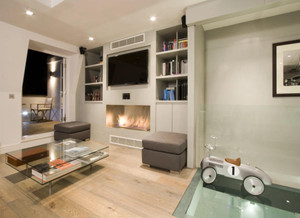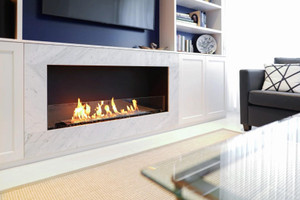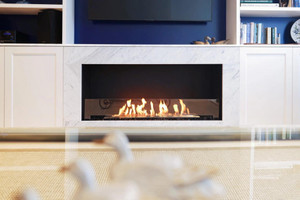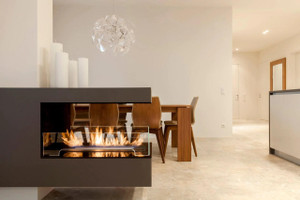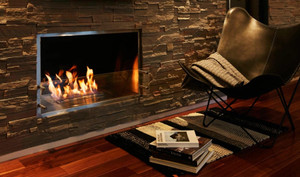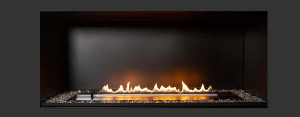
Ethanol Fireplace Essentials: Your Complete Guide to Biofuel Heaters
Ethanol fireplaces represent a modern twist to the traditional fireplace experience. These sleek, innovative heating solutions operate using bioethanol fuel—a type of alcohol made from biological sources such as crops and sugarcane—offering a more environmentally friendly alternative to wood or gas fireplaces. Ethanol fireplaces do not require a chimney as they produce a clean burn that emits no smoke, soot, or ash, which allows them to be installed virtually anywhere within a home or commercial space.
One of the appealing features of ethanol fireplaces is the ease of installation. Unlike traditional fireplaces that demand extensive ventilation systems and permanent structural provisions, ethanol options can range from wall-mounted units to insert designs that can be placed into existing fireplace cavities. This flexibility has led to an increase in the popularity of ethanol fireplaces for both supplemental heating and as decorative focal points.
Bioethanol fuel itself is praised for efficiency and convenience. These fireplaces typically come with a fuel box, which can vary in size from 1 liter for smaller manual models to larger capacities for automatic models, accommodating different design and heat output needs. Despite their simplicity, safety remains paramount with any fireplace; therefore, it's crucial to only use fuel intended for these specific fireplaces and follow the manufacturer’s instructions carefully. Ethanol fireplaces continue to provide an attractive option for both indoor and outdoor settings, combining ease of use with aesthetic versatility.
Types of Ethanol Fireplaces
Ethanol fireplaces offer a clean and eco-friendly way to add warmth and ambiance to a space. They come in various designs to suit different needs and preferences.
Bioethanol Fireplace
Bioethanol fireplaces use a renewable energy source derived from plants like sugar cane and maize. These standalone units provide flexibility in installation and placement, making them suitable for various settings.
Ethanol Fireplace Insert
Designed to fit into existing hearths, ethanol fireplace inserts convert traditional wood-burning fireplaces into clean-burning units. They typically involve a grate and ceramic logs to mimic the aesthetic of real wood fires.
Indoor Ethanol Fireplace
Indoor ethanol fireplaces are a versatile category that includes tabletop models, freestanding units, and fireplace inserts. They require no chimney, allowing them to be used in any room without complex installation.
Wall Mounted Ethanol Fireplace
Wall-mounted models are a space-saving solution that impart a contemporary feel. These units are attached directly to the wall, serving as both a heating element and a piece of art.
Ventless Ethanol Fireplace
Ventless ethanol fireplaces don't require a flue or chimney, making them easy to install and maintain. They are designed to burn ethanol fuel efficiently, producing no harmful emissions and minimal residue.
Fuel and Safety Considerations
Using the correct fuel and adhering to safety measures ensures the efficient operation of bio ethanol fireplaces while minimizing risks.
Bio Ethanol Fireplace Fuel
Bio ethanol fireplace fuel is a specialized product derived from renewable sources like sugar cane and corn. It is known for its clean burn, producing only water vapor and carbon dioxide as byproducts. Consumers usually find this fuel sold per liter, with prices ranging widely based on location and brand.
Bio Ethanol Fuel for Fireplaces
It is crucial to use only high-quality bio ethanol fuel specifically designed for fireplaces. Using inappropriate fuel can lead to damaging the fireplace, producing harmful emissions, or increasing the risk of fire-related incidents.
Ethanol Alcohol Fireplace
Ethanol alcohol fireplaces operate using denatured ethanol, which means it has been treated to prevent ingestion. The substance burns cleanly and efficiently, eliminating the need for a flue or chimney, commonly found in traditional combustion-based fireplaces.
Fireplace Fuel Ethanol
The proper handling of fireplace fuel ethanol involves:
- Storing fuel in a cool, dry place away from direct sunlight
- Keeping the fuel away from open flames or ignition sources
- Ensuring to never refill the fireplace while it is still hot or in operation
Frequently Asked Questions
When considering the use of ethanol fireplaces, consumers frequently have questions regarding their maintenance, safety, choice for their homes, fuel longevity, and environmental impact.
How do I properly maintain and clean an ethanol fireplace?
Ethanol fireplaces require regular cleaning to ensure safe operation and optimal performance. A user should wipe down the exterior surfaces with a damp cloth to remove any dust or residue and check the burner for any blockages. It's advised to clean the burner with a soft cloth when it's cool and to follow the manufacturer's guidelines for any specific maintenance procedures.
Can ethanol fireplaces be used indoors safely?
Ethanol fireplaces can be used safely indoors if proper ventilation is provided and they are operated according to the manufacturer's instructions. They should be placed in well-ventilated rooms and monitored during use to ensure that oxygen levels remain safe.
What should be considered when choosing the best ethanol fireplace for my home?
When selecting an ethanol fireplace, one should consider the size of the room, the fireplace's heat output, design, and the required maintenance. It is important that the selected model suits the space it will heat and complements the aesthetic of the home. Quality of materials and safety features should also be taken into account.
How long does ethanol fireplace fuel typically last during continuous use?
The duration of ethanol fuel can vary depending on the fireplace model and the size of the burner. Typically, a liter of bioethanol fuel can burn from 4 to 5 hours. It's important to refer to the specifications of the individual fireplace model for more precise information.
What are the environmental impacts of using an ethanol fireplace compared to other types?
Ethanol fireplaces are considered a more environmentally friendly option because they use bioethanol, a renewable energy source made from organic materials such as sugar cane and corn. They produce no smoke and minimal carbon dioxide, reducing the particulate emissions that can come from traditional wood-burning fireplaces.






